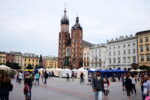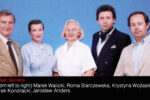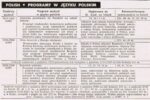Posłuchaj wywiadu z kardynałem Karolem Wojtyła dla Głosu Ameryki w czasie jego wizyty w Stanach Zjednoczonych w sierpniu 1976 roku. Sekcja polska Głosu Ameryki powtórzyła wywiad 16 października 1978 r. w dniu wyboru kardynała Wojtyły na stolicę piotrową.
„Głód prawdy” – fragment wywiadu Tadeusza Lipienia dla Głosu Ameryki z kardynałem Karolem Wojtyłą, sierpień 1976 r.
TADEUSZ LIPIEŃ: Ponieważ właśnie zakończony Kongres Eucharystyczny w Filadelfii był, jak sądzę, głównym celem wizyty jego eminencji w Stanach Zjednoczonych, czy mogę w związku z tym prosić księdza kardynała o podzielenie się z nami swymi wrażeniami z Kongresu, oraz o kilka słów o jego celach i osiągnięciach?
KAROL WOJTYŁA: Kongres Eucharystyczny w Filadelfii był niewątpliwie owocem gruntownej koncepcji, wielkiej pracy i wielorakich przygotowań. Pod tym kątem należy moim zdaniem rozpatrywać również jego wyniki. Koncepcja Kongresu znalazła swój wyraz w jego myśli przewodniej: eucharystia a głody współczesnego człowieka. Myśl ta została rozprowadzona w całym szeregu tematów. Nie ulega wątpliwości, że istnieje powszechna potrzeba uświadomienia głodu fizycznego, głodu chleba powszedniego, że ten głód jest losem wielu ludzi i społeczeństw. Potrzeba uświadomienia tej sprawy podstawowej dla wielu tak zwanych społeczeństw niedorozwiniętych zachodzi niewątpliwie w szczególny sposób w Ameryce, wobec tego najbogatszego chyba społeczeństwa świata.
Problem głodu jest, jak widać, problemem sprawiedliwości w wymiarze całej wielkiej rodziny ludzkiej. Kardynał Król i organizatorzy Kongresu, podejmując ten problem, poszli za głosem takich encyklik jak Mater et magistra Jana XXIII czy też Populorum progressio Pawła VI.
W parze z tym podstawowym, jeśli tak się można wyrazić, problemem głodu, idą inne jeszcze głody współczesnego człowieka – niemniej głębokie i niemniej dotkliwie odczuwane w różnych społeczeństwach, czy też w poszczególnych środowiskach, czy wreszcie przez poszczególnych ludzi. Słusznie więc organizatorzy Kongresu włączyli w jego program takie tematy jak: głód wolności, głód prawdy, głód zrozumienia, głód miłości. Tym wszystkim głodom człowieka współczesnego, eucharystia nadaje ostateczny niejako wymiar – człowiek jest głodny Boga, niespokojne jest jego serce poza nim.
“Hunger for God and Love” – Interview with Cardinal Karol Wojtyła in Washington, DC recorded by Tadeusz “Ted” Lipień for the Voice of America (VOA) in August 1976.
This is a full audio recording of the interview in Polish.
The radio interview, recorded and first broadcast by the Voice of America (VOA) in 1976, was rebroadcast by VOA’s Polish Service on October 16, 1978, after the news of Cardinal Karol Wojtyła’s election as the new pope had been announced at the Vatican.
Partial English Transcript
Ted Lipien: I believe the just-concluded Eucharistic Congress in Philadelphia was the main purpose of your Eminence’s visit to the United States; may I ask you to share with us your impressions and summarize the Congress’s goals and results?
Card. Karol Wojtyla: The Eucharistic Congress in Philadelphia was without any doubt the result of a solid concept, enormous work, and many preparations. In this spirit one should, I believe, also look at its results.
The concept of the Congress was expressed in its main theme: “The Eucharist and the Hungers of Contemporary Man.”* This theme was divided into many subjects.
There is no doubt that we have a common need to raise awareness of the physical hunger — the hunger for daily bread — that this hunger afflicts many people and societies. The need to raise awareness about this issue, which is basic for many so-called underdeveloped societies, is especially present in America, in this perhaps the richest nation in the world.
The problem of hunger is as we can see the problem of justice for the entire human family. By taking on this issue, Cardinal Krol and the organizers of the Congress followed such papal encyclicals as John XXIII’s Mater at Magistra and Paul VI’s Populorum Progressio.
Together with this basic hunger– if one could use this expression — go other types of hungers of today’s Man, equally great and equally deeply felt by various societies, by different groups, and finally by individuals.
The organizers of the Congress rightly included in its program such themes as: “The Hunger for Liberty, “The Hunger for Truth,” “The Hunger for Understanding,” “The Hunger for Love.”
To all of these hungers of today’s Man, the Eucharist provides a final dimension: Man hungers for God. His heart is unsettled without him.
* ”The Eucharist and the Aspirations of the Human Family” was the official theme of the 41st International Eucharistic Congress in Philadelphia, August 1-8, 1976.






